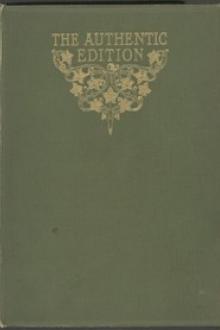The Clicking of Cuthbert by P. G. Wodehouse (acx book reading TXT) 📗

- Author: P. G. Wodehouse
Book online «The Clicking of Cuthbert by P. G. Wodehouse (acx book reading TXT) 📗». Author P. G. Wodehouse
It was not, however, beyond the scope of Vincent Jopp, the superman. Vincent Jopp, was, I am inclined to think, the only golfer who ever approached the game in a spirit of Pure Reason. I have read of men who, never having swum in their lives, studied a text-book on their way down to the swimming bath, mastered its contents, and dived in and won the big race. In just such a spirit did Vincent Jopp start to play golf. He committed McHoots's hints to memory, and then went out on the links and put them into practice. He came to the tee with a clear picture in his mind of what he had to do, and he did it. He was not intimidated, like the average novice, by the thought that if he pulled in his hands he would slice, or if he gripped too tightly with the right he would pull. Pulling in the hands was an error, so he did not pull in his hands. Gripping too tightly was a defect, so he did not grip too tightly. With that weird concentration which had served him so well in business he did precisely what he had set out to do—no less and no more. Golf with Vincent Jopp was an exact science.
The annals of the game are studded with the names of those who have made rapid progress in their first season. Colonel Quill, we read in our Vardon, took up golf at the age of fifty-six, and by devising an ingenious machine consisting of a fishing-line and a sawn-down bedpost was enabled to keep his head so still that he became a scratch player before the end of the year. But no one, I imagine, except Vincent Jopp, has ever achieved scratch on his first morning on the links.
The main difference, we are told, between the amateur and the professional golfer is the fact that the latter is always aiming at the pin, while the former has in his mind a vague picture of getting somewhere reasonably near it. Vincent Jopp invariably went for the pin. He tried to hole out from anywhere inside two hundred and twenty yards. The only occasion on which I ever heard him express any chagrin or disappointment was during the afternoon round on his first day out, when from the tee on the two hundred and eighty yard seventh he laid his ball within six inches of the hole.
"A marvellous shot!" I cried, genuinely stirred.
"Too much to the right," said Vincent Jopp, frowning.
He went on from triumph to triumph. He won the monthly medal in May, June, July, August, and September. Towards the end of May he was heard to complain that Wissahicky Glen was not a sporting course. The Greens Committee sat up night after night trying to adjust his handicap so as to give other members an outside chance against him. The golf experts of the daily papers wrote columns about his play. And it was pretty generally considered throughout the country that it would be a pure formality for anyone else to enter against him in the Amateur Championship—an opinion which was borne out when he got through into the final without losing a hole. A safe man to have betted on, you would have said. But mark the sequel.
The American Amateur Championship was held that year in Detroit. I had accompanied my employer there; for, though engaged on this nerve-wearing contest, he refused to allow his business to be interfered with. As he had indicated in his schedule, he was busy at the time cornering wheat; and it was my task to combine the duties of caddy and secretary. Each day I accompanied him round the links with my note-book and his bag of clubs, and the progress of his various matches was somewhat complicated by the arrival of a stream of telegraph-boys bearing important messages. He would read these between the strokes and dictate replies to me, never, however, taking more than the five minutes allowed by the rules for an interval between strokes. I am inclined to think that it was this that put the finishing touch on his opponents' discomfiture. It is not soothing for a nervous man to have the game hung up on the green while his adversary dictates to his caddy a letter beginning "Yours of the 11th inst. received and contents noted. In reply would state——" This sort of thing puts a man off his game.
I was resting in the lobby of our hotel after a strenuous day's work, when I found that I was being paged. I answered the summons, and was informed that a lady wished to see me. Her card bore the name "Miss Amelia Merridew." Amelia! The name seemed familiar. Then I remembered. Amelia was the name of the girl Vincent Jopp intended to marry, the fourth of the long line of Mrs. Jopps. I hurried to present myself, and found a tall, slim girl, who was plainly labouring under a considerable agitation.
"Miss Merridew?" I said.
"Yes," she murmured. "My name will be strange to you."
"Am I right," I queried, "in supposing that you are the lady to whom Mr. Jopp——"
"I am! I am!" she replied. "And, oh, what shall I do?"
"Kindly give me particulars," I said, taking out my pad from force of habit.
She hesitated a moment, as if afraid to speak.
"You are caddying for Mr. Jopp in the Final tomorrow?" she said at last.
"I am."
"Then could you—would you mind—would it be giving you too much trouble if I asked you to shout 'Boo!' at him when he is making his stroke, if he looks like winning?"
I was perplexed.
"I don't understand."
"I see that I must tell you all. I am sure you will treat what I say as absolutely confidential."
"Certainly."
"I am provisionally engaged to Mr. Jopp."
"Provisionally?"
She gulped.
"Let me tell you my story. Mr. Jopp asked me to marry him, and I would rather do anything on earth than marry him. But how could I say 'No!' with those awful eyes of his boring me through? I knew that if I said 'No', he would argue me out of it in two minutes. I had an idea. I gathered that he had never played golf, so I told him that I would marry him if he won the Amateur Championship this year. And now I find that he has been a golfer all along, and, what is more, a plus man! It isn't fair!"
"He was not a golfer when you made that condition," I said. "He took up the game on the following day."
"Impossible! How could he have become as good as he is in this short time?"
"Because he is Vincent Jopp! In his lexicon there is no such word as impossible."
She shuddered.
"What a man! But I can't marry him," she cried. "I want to marry somebody else. Oh, won't you help me? Do shout 'Boo!' at him when he is starting





Comments (0)